May Day: the workers bank holiday
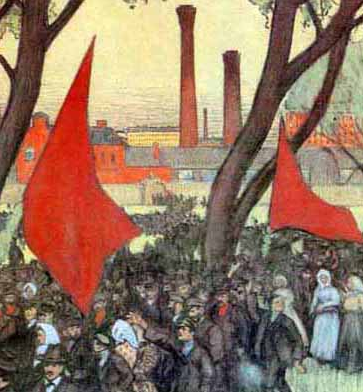
Well as is typical on a Bank Holiday Monday, I've just been outside and it's been raining. It looks like it'll clear up though. We've got a busy day today in the village. There's a May Day Boot Sale at the school, the Heritage line up in Stanhope has got events on and if it's sunny everyone will either be heading off to the Lakes or to the seaside. Some will just spend the day at the pub. Our newly elected Fascists will be frantically googling what exactly it is that councillors do now it's dawning on their pea brains that they can't stop the boats in the Consett.
May Day isn’t just a day off work. It’s International Workers’ Day. Born in the blood, sweat, and struggle of the working class. It commemorates the 1886 Haymarket Affair in Chicago, when workers striking for an eight-hour day were massacred by police. It’s a global day of solidarity, resistance, and remembrance, rooted in working-class history and socialist values. In the UK, it’s the only official recognition of workers’ contributions to society. Every other state ceremony, from the King’s birthday to Remembrance Day, centres the elite, the military, or national identity. May Day centres on labour and the working class: the people who build the wealth, run the hospitals, clean the streets, teach the children, and keep the country alive.
Whilst International Workers Day is May 1st. In Britain it is usually the first Monday in May and overlays onto a number of springtime traditions such as May Poles, morris dancing and May Queen events that go back to pre-Christian times. Surprisingly, it is a relatively modern holiday in Britain. It was introduced by the Labour government of Prime Minister James Callaghan, and the first official May Day bank holiday was observed on May 1, 1978 to recognise International Workers' Day.
Of course the Tories viewed the holiday as ideologically left-wing, associating it with communism and Soviet-style celebrations of workers. Many Conservatives felt it was un-British and preferred traditional celebrations like Trafalgar Day (October 21) or St. George’s Day (April 23) instead.
Margaret Thatcher, who became Prime Minister in 1979, hated it. She considered abolishing or moving it, but ultimately the holiday survived, largely because it had quickly become popular with the public as a springtime break.
Despite periodic calls over the years to scrap or move it, the May Day Bank Holiday remains in place, a lasting legacy of Labour and trade union influence.
In actual fact only those active on the left and the far-right these days even consider this a political holiday. Everyone else just sees it as along weekend. But it periodically becomes a political battleground as the left fight for it and the right try to abolish it.
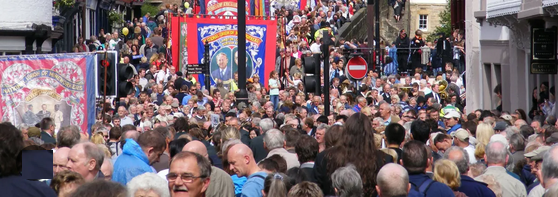
In this political moment, as the far right gains ground, as corporations tighten their grip on politics, as trade unions face suppression, May Day is a living challenge to a system that devalues workers and empowers billionaires. Here’s why we must defend and elevate it now:
1. Austerity & Exploitation
Tory austerity has gutted public services, forced millions into poverty, and handed wealth to the top. May Day is a defiant reminder that the working class won’t quietly accept being bled dry to fund tax cuts for the rich. The Labour Party don't seem to want to role this back and May Day is a reminder that the Labour Party would be nothing without the working class and it should do well to remember this.
2. Union Busting & Worker Surveillance
Unions, the historic bedrock of May Day, are being throttled. Anti-strike laws, minimum service legislation, and employer intimidation all aim to silence collective power. May Day is a line in the sand. It’s a day to say: we still believe in solidarity.
3. The Far Right’s Nationalist Mythmaking
The far right wants to rewrite history, replacing class struggle with flag-waving patriotism, replacing solidarity with scapegoating, and painting migrants, not billionaires, as the enemy. May Day cuts through the lies. It speaks to internationalism, not nationalism; class unity, not division.
4. Erasure of Working-Class History
We’re watching a deliberate attempt to depoliticise and de-radicalise public memory. May Day reminds us that the rights we enjoy — weekends, paid holidays, minimum wage — were fought for, not handed down. To let May Day fade is to surrender the truth of that struggle.
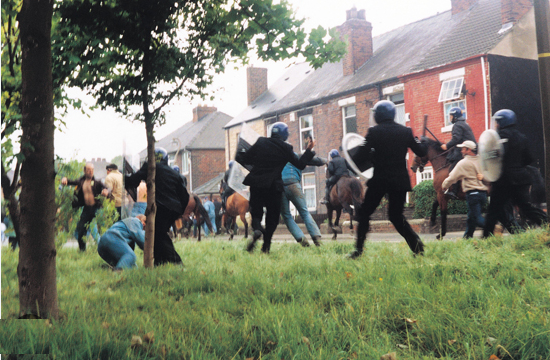
Battle of Orgreave 1985: Where the Police were politicised and militarised by the Thatcher Goverment and used against starving strikers fighting for their livelihoods.
May Day: The Workers’ Call to Arms
May Day, International Workers’ Day, is not just a day off. It’s not about bunting, bank holiday barbecues, or Union Jacks. It’s a day of defiance, a day of remembrance, and most of all, a call to arms for every working-class person who knows that freedom is never given, it’s fought for. It marks a global struggle, born in blood, but it is also deeply British. The UK has a proud, radical history of working-class resistance, and May Day is the one day we honour it.
The 1926 General Strike
Nine days when the working class downed tools in solidarity with the miners. It was the first and only time in UK history that nearly the entire trade union movement stopped the country cold. They said: “If you come for one of us, you come for all of us.” May Day remembers that unity, and demands we find it again.
The International Brigades
In the 1930s, thousands of British volunteers: dockers, teachers, miners, unemployed lads from South Wales and Scotland went to fight fascism in Spain. Not for money, not for medals, but for working-class internationalism. They stared down Hitler and Franco before Britain’s own elites had the guts to speak up. May Day honours them and our anti-fascist dead. Moreso it reminds the fascists in our midst that we don't accept them.
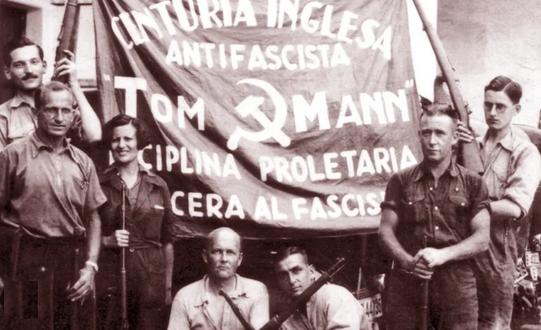
British communists who went to fight Fascists in Spain. We might have to do that a bit closer to home soon
The Battle of Cable Street (1936)
East London. Fascist Oswald Mosley’s blackshirts tried to march through the Jewish and working-class neighbourhoods. Who stopped them? Not the police. It was workers, communists, Jews, Irish dockers, and trade unionists who built barricades and shouted: “They shall not pass!” May Day remembers that street-by-street resistance.
The Miners’ Strike (1984–85)
A year-long class war. Thatcher tried to crush the NUM and destroy union power. But mining communities, men and women, stood unbroken. They fed each other, fought police violence, and refused to bow. May Day honours them: not as victims, but as warriors.
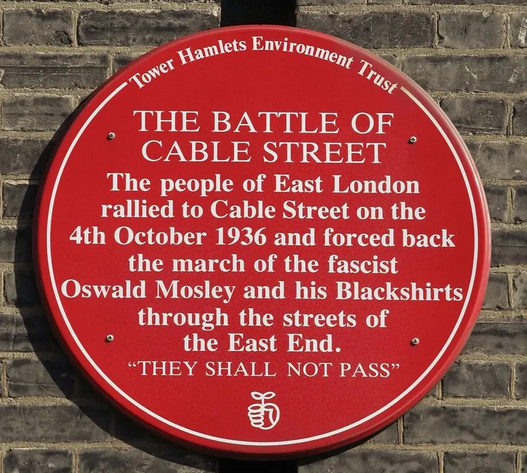
The Labour Movement and trade unions in the UK have played a crucial role in securing many of the rights and protections that workers enjoy today. Everything is foubhgt for, nothing is given. Here's a quick reminder of some key workers rights we wouldn't have if it wasn't for the Labour movement:
1. The Right to a Minimum Wage
- Introduced as the National Minimum Wage in 1999 by the Labour government.
- Championed by trade unions to combat poverty pay.
2. The 8-Hour Workday / 40-Hour Week
- Result of long campaigns starting in the 19th century.
- Enshrined in legislation over time to prevent excessive working hours.
3. Paid Holidays
- Now legally at least 28 days (including bank holidays) for full-time workers.
- Secured through campaigning for work-life balance and decent conditions.
4. Sick Pay
- Statutory Sick Pay (SSP) was introduced in 1983.
- Pressure from unions ensured employers had to support workers during illness.
5. Health and Safety at Work
- The Health and Safety at Work Act 1974 followed major union pressure.
- Gave workers legal protections and led to safer workplaces.
6. Protection Against Unfair Dismissal
- Enshrined in the Employment Protection Act 1975 and subsequent laws.
- Enabled by union lobbying for fair treatment.
7. Maternity, Paternity & Parental Leave
- Strengthened through legislation influenced by union and Labour advocacy.
- Ensures time off and job security for new parents.
8. Equal Pay & Anti-Discrimination
- The Equal Pay Act 1970 and Equality Act 2010 (among others) came about through years of pressure from labour and feminist groups.
- Trade unions have supported workers in enforcing these rights.
9. Union Recognition and Collective Bargaining
- The Employment Relations Act 1999 gave statutory backing to union recognition.
- Collective bargaining has historically been the main tool for improving pay and conditions.
10. Right to Strike
- Although restricted, it remains a fundamental labour right.
- Fought for and defended by unions as a last resort to resolve disputes.
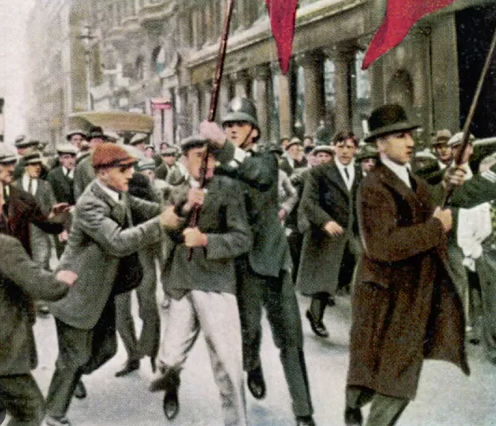
A policeman tries to wrestle a red flag from a worker in the General Strike 1926. The Police will always side with the establishment and as we saw in the Battles of Cable Street and Stockton, with the Far-Right
Of course May Day isn’t just about the dignity of labour, it's about social justice and liberation. Everything we have, every right we take for granted, was won through struggle:
- Universal suffrage: won by suffragists and campaigners who defied prisons and police batons.
- Women's equality: the fight for legal equality with men, a fight still ongoing
- LGBTQ+ rights: won by gay people who faced jail, state violence, and moral hysteria.
- Disability justice: won by direct action, protests, and relentless organising, not charity.
- Racial equality and diversity: fought for by Black and brown communities who stood up to police brutality, racist laws, and a system rigged against them.
The far right hates all of this. They want to drag us backwards to a world where the rich rule, the different are crushed, and the workers know their place. That’s why they hate May Day. Because May Day reminds us we fought, and if the circumstances demand it we will fight again
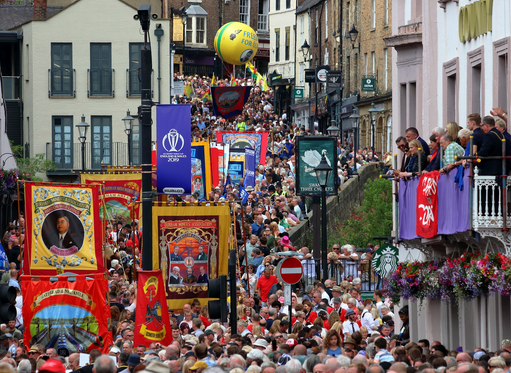
Durham Miners Gala. An annual demonstration of workers solidarity. How sad it is that the Labour Party have pushed this once solid red county into the hands of the Fascists.
To Fight For May Day Is To Fight For Us All
Keeping May Day alive isn’t a nostalgic ritual. it’s an act of resistance. In the face of culture wars, economic war, and creeping fascism, holding space for worker power matters. That red flag, raised in parks and picket lines, says: We remember. We resist. We rise. They are the antithesis of the far-right as they believe in collective strenth where the far-right believe in divide and rule. If we don’t fight to honour May Day, the far right will keep erasing every trace of working-class struggle. So we march. We rally. We tell our stories. Because history belongs to the people who fight for it.
THE WORKERS, UNITED, WILL NEVER BE DEFEATED
NO PASARAN!

